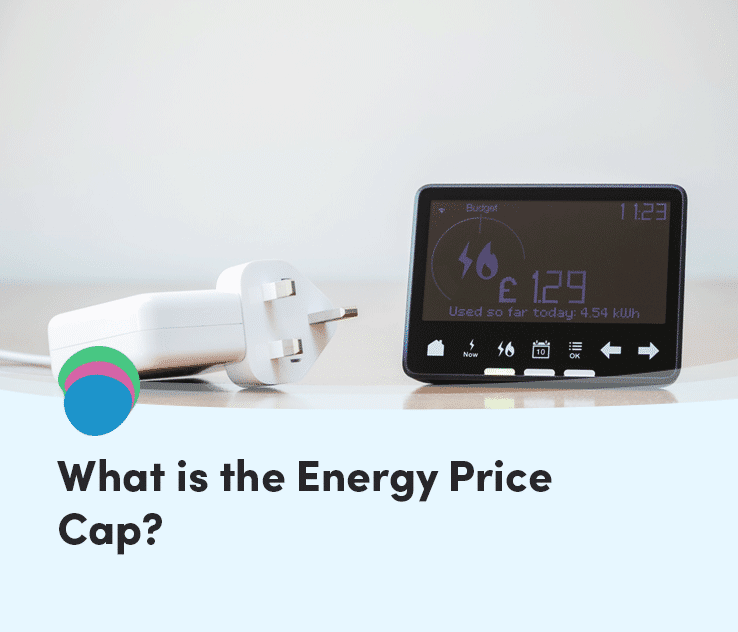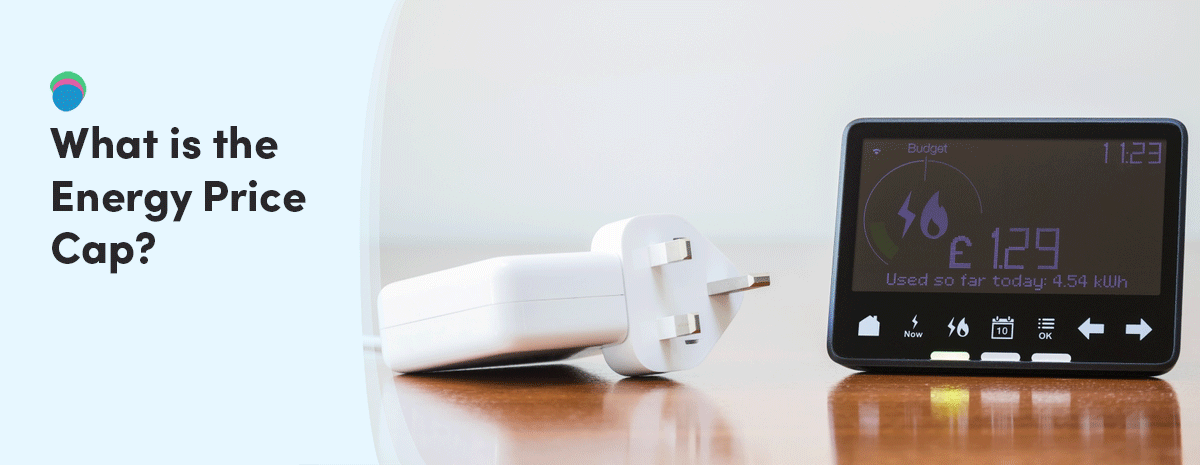What is the Energy Price Cap?
The energy price cap is a regulatory measure set by Ofgem, the body that oversees energy suppliers in Great Britain. Its primary purpose is to limit the maximum amount energy suppliers can charge consumers for each unit of gas and electricity they consume.
Additionally, the cap also sets a maximum daily standing charge, which is the fee consumers pay to have their homes connected to the energy grid.
Introduced on 1 January 2019, the energy price cap was designed to protect millions of households on expensive variable tariffs from being overcharged. It is particularly applicable to providers’ standard and default tariffs, which a significant majority of households are subscribed to. The cap is influenced by several factors, with wholesale energy prices (the prices that energy firms pay) being a major determinant.
It’s important to note that while the cap limits the rate at which energy is charged, the total bill can still vary based on individual consumption. In other words, if you use more energy, your bill will be higher, and if you use less, it will be lower. The cap undergoes periodic adjustments, reflecting changes in the energy market and other influencing factors.
Read on to learn more about the Energy Price Cap.

Article Contents
What is the current Energy Price Cap?
As of 1 October, to 31 December 2023, the energy price cap is set at £1,834 a year for a typical household that uses both gas and electricity and pays by Direct Debit.
This cap is determined by Ofgem, the regulatory body overseeing energy suppliers in Great Britain. The cap amount is based on various factors, including the wholesale prices of energy and other operational costs faced by energy suppliers.
It’s essential to understand that this cap represents the maximum amount suppliers can charge for each unit of energy and the daily standing charge. However, the actual bill a consumer receives will depend on their individual energy consumption.
When will the Price Cap next change?
The Energy Price Cap is set to undergo its next adjustment on 1 January 2024.
While the exact figures will be determined by various factors closer to the date, current strong predictions indicate an increase of approximately 3.5%, setting the cap at around £1,898 a year based on the new typical usage figures. It’s important to note that these figures are predictions and can be influenced by various market dynamics and regulatory decisions.
For a clearer understanding of the Energy Price Cap’s historical and predicted changes, here’s a table showing the adjustments:
| Time Period | Cap Based on New Typical Usage | Cap Based on Old Typical Usage |
|---|---|---|
| 1 Jul – 30 Sept 2023 | £1,976 | £2,074 |
| 1 Oct – 31 Dec 2023 | £1,834 (↓7%) | £1,923 (↓7%) |
| 1 Jan – 31 Mar 2024 | £1,898 (↑3.5% – Strong Prediction) | £1,996 (↑4%) |
| 1 Apr – 30 Jun 2024 | £1,820 (↓4% – Weak Prediction) | £1,912 (↓4%) |
| 1 Jul – 30 Sep 2024 | £1,781 (↓2% – Estimated) | £1,872 (↓2%) |
| 1 Oct – 31 Dec 2024 | £1,825 (↑2.5% – Estimated) | £1,922 (↑2%) |
Notes:
- The figures are based on a dual-fuel household paying by direct debit.
- New typical usage is defined as 2,700kWh of electricity and 11,500kWh of gas.
- Old typical usage is defined as 2,900kWh of electricity and 12,000kWh of gas.
- Predictions are based on the latest insights as of 29 September 2023 from Cornwall Insight analysts.
When is the Price Cap assessed?
The Energy Price Cap is assessed every three months.
These assessments are conducted by Ofgem, the regulatory body for energy in Great Britain. During these assessments, Ofgem reviews various factors, including wholesale energy prices, to determine the appropriate cap level for the upcoming period. Once the assessment is complete, Ofgem announces the new cap, which then comes into effect on specific dates.
To provide a clearer picture of the assessment timings and related dates, here’s a table detailing the recent and upcoming assessment periods:
| Price Cap Duration | Announcement Date | Wholesale Price Review Period |
|---|---|---|
| 1 Jul – 30 Sept 2023 | 25 May 2023 | 20 Feb – 18 May 2023 |
| 1 Oct – 31 Dec 2023 (Current) | 25 Aug 2023 | 19 May – 17 Aug 2023 |
| 1 Jan – 31 Mar 2024 | 23 Nov 2023 | 18 Aug – 15 Nov 2023 |
| 1 Apr – 30 Jun 2024 | 23 Feb 2024 | 16 Nov 2023 – 15 Feb 2024 |
| 1 Jul – 30 Sept 2024 | 28 May 2024 | 16 Feb – 16 May 2024 |
| 1 Oct – 31 Dec 2024 | 27 Aug 2024 | 17 May – 16 Aug 2024 |
What factors do Ofgem consider during these assessments and how do they impact the Energy Price Cap?
Ofgem, the regulatory authority for energy in Great Britain, conducts comprehensive assessments of various factors to determine the appropriate level for the Energy Price Cap.
These factors are crucial as they directly influence the costs energy suppliers face when providing gas and electricity to households. Here are the primary components Ofgem evaluates:
Wholesale Energy Costs: This is the amount energy suppliers pay to purchase gas and electricity. It’s a significant component, accounting for roughly 50% of a typical bill. Fluctuations in global energy markets, supply and demand dynamics, and geopolitical events can cause these costs to vary, which in turn affects the cap.
Network Costs: These are the expenses associated with building, maintaining, and operating the infrastructure (like pipes and wires) that delivers energy to households. It represents about 20% of a typical bill.
Operating Costs: This covers expenses related to billing, metering services, and the rollout of smart meters. It constitutes around 12% of the cap on average.
Policy Costs: These support government environmental and social initiatives, such as encouraging households to save energy, reduce emissions, and adopt renewable energy technologies like solar panels. They make up about 9% of a typical bill.
VAT: Value Added Tax for energy is set at 5% and is added to all tariff rates.
Earnings: This portion is the profit for suppliers. Ofgem ensures that this is a ‘fair rate of return’, and it typically represents around 2% of a bill.
Payment Method Allowance: This covers the costs associated with different payment methods, such as monthly direct debits or quarterly payments. The exact percentage varies based on the payment method.
Adjustment Allowance: Ofgem can factor in any special, unexpected costs. For instance, costs resulting from supplier failures or other unforeseen market events can be added to the cap.
Other Costs: There are additional minor costs, like the ‘headroom allowance’, which provides a buffer for unexpected expenses.
Each of these factors is meticulously evaluated, and their combined total determines the final cap amount. It’s worth noting that while some of these costs are relatively stable, others, especially wholesale energy prices, can be highly volatile, leading to significant changes in the cap from one assessment period to the next.
How much are the kWh rates and standing charges under the Price Cap?
The Energy Price Cap, set by Ofgem, determines the maximum rates consumers can be charged for gas and electricity. These rates are based on the average unit rates per kilowatt hour (kWh) and the daily standing charges.
The rates vary depending on the payment method and can differ by region.
| Payment Method | Energy Type | Unit Rate (per kWh) | Standing Charge (per day) |
|---|---|---|---|
| Direct Debit | Gas | 6.89p | 29.62p |
| Electricity | 27.35p | 53.37p | |
| Prepayment | Gas | 6.67p | 34.20p |
| Electricity | 26.92p | 55.52p | |
| On Receipt of Bill | Gas | 7.26p | 34.99p |
| Electricity | 28.79p | 60.03p |
It’s essential to note that these rates and charges are averages and can vary based on the region you reside in. Additionally, the government has introduced a minor subsidy on the Price Cap rates for those using prepayment methods. This initiative ensures that prepaying customers don’t end up paying more than those who opt for direct debit payments.
What are daily standing charges and what do they pay for?
Daily standing charges are fixed costs that consumers pay to their energy suppliers, regardless of the amount of energy they consume.
These charges are levied every day and are a part of your energy bill. They cover the costs associated with:
- Infrastructure Maintenance: The upkeep of the pipes and wires that deliver gas and electricity to your home.
- Energy Supply: Ensuring that gas and electricity are always available when you need them, even if you don’t use them.
- Operational Costs: Administrative expenses such as billing, meter reading, and customer service.
- Connection: The cost of having your home connected to the energy grid.
It’s essential to understand that even if you don’t use any energy, you’ll still incur the daily standing charge. This is because the infrastructure and services need to be maintained and available at all times, ensuring that energy is accessible whenever you decide to use it.
For households with both gas and electricity, the average direct debit standing charge can vary based on the region. For instance, while in London it might be £249/year, in areas like North Wales and Mersey, it could be as much as £335/year. The variance in charges is attributed to the differing costs of transporting power to various regions.
In essence, daily standing charges are a crucial component of the energy billing system, ensuring that the energy infrastructure remains robust, reliable, and ready to serve consumers at all times.
How do I know if I am on a price-capped energy tariff?
You are on a price-capped energy tariff if you are on a ‘default’ tariff, which you haven’t actively chosen. This includes standard variable tariffs (SVTs).
Here are the specific scenarios that indicate you’re on a price-capped tariff:
- You’ve Never Switched: If you’ve never changed your energy tariff, you’re on your supplier’s standard tariff, which is protected by the Price Cap.
- End of a Fixed Deal: If you were on a fixed deal and didn’t switch after its conclusion, you’d automatically be on a price-capped tariff.
- Supplier Went Bust: If your energy supplier goes under, your existing tariff ends. Ofgem will assign a new supplier for you, and your new tariff will fall under the Price Cap.
- Moving Homes: Typically, when you move, your current tariff ends. Once you inform the supplier at your new residence, they’ll place you on a ‘default’ tariff, which is governed by the Price Cap.
However, there are a few exceptions:
- Some providers might offer rates below the Price Cap, especially when taking over customers from defunct suppliers. But these cases are rare.
- The Price Cap doesn’t cover standard variable tariffs exempted from it. These are usually very green deals that you must actively choose.
Given the current energy crisis, a vast majority of consumers find themselves on price-capped tariffs. It’s essential to stay informed and understand your tariff to ensure you’re getting the best deal and protection available.
Does how I pay my bill impact the Price Cap?
Yes, the method you use to pay your energy bill does influence the Price Cap.
Here’s a breakdown based on different payment methods:
- Direct Debit: If you pay via monthly direct debit, the Price Cap for the period from 1 October to 31 December 2023 is set at an average of £1,834 annually. This is based on Ofgem’s revised, lower typical consumption values.
- Cash, Cheque, or Quarterly Direct Debit: For those who opt for these payment methods, the Price Cap is set at £1,959 annually for typical usage. The reason it’s higher than the direct debit method is to account for the extra costs suppliers incur when billing customers who don’t use monthly direct debits.
- Prepayment: For individuals who prepay for their energy, the Price Cap stands at £1,861 annually based on typical consumption. However, there’s a discount applied, bringing it down to £1,821 per year. While it generally costs more for suppliers to bill prepayment meter customers compared to those on direct debits, the government has introduced a slight reduction. Through the EPG, the Price Cap rates are discounted by 4.5p on electricity standing charges and 5.9p on gas standing charges. This initiative is part of the government’s pledge to eliminate the ‘prepay premium’.
In essence, the way you choose to pay your energy bill can affect the amount you’re charged under the Price Cap, so it’s crucial to be aware of these differences and choose the method that best suits your needs and budget.
How long will energy prices be capped?
Energy prices will be capped at least until the end of 2024.
Initially, when the Price Cap was introduced, it was slated to last until the end of 2020. However, given the evolving energy landscape and market conditions, the government has expressed its willingness to extend the Price Cap beyond 2024 if deemed necessary.
How did the Price Cap evolve?
The Energy Price Cap, introduced to protect consumers from excessive energy prices, has seen several adjustments since its inception in 2019.
Initially, the cap was adjusted every six months. However, this frequency changed, and from October 2022, adjustments were made every three months. These changes are primarily influenced by the average energy wholesale prices in the preceding months.
Interestingly, between October 2022 and June 2023, consumers didn’t pay the full amount stipulated under the Price Cap due to discounts provided by the Energy Price Guarantee (EPG) scheme.
To provide a clearer picture of the Price Cap’s evolution, here’s a rephrased table detailing the changes:
Evolution of the Energy Price Cap
| Period | Monthly Direct Debit | Prepayment | Other Payment Methods |
|---|---|---|---|
| Winter 2023 (Oct-Dec) | £1,834/year | £1,821/year* | £1,959/year |
| Summer 2023 (until Sep) | £2,074/year | £2,046/year** | £2,211/year |
| Spring 2023 (until Jun) | £3,280/year | £3,325/year | £3,482/year |
| Winter 2023 (until Mar) | £4,279/year | £4,358/year | £4,533/year |
| Autumn 2022 (until Dec) | £3,549/year | £3,608/year | £3,764/year |
| Summer 2022 | £1,971/year | £2,017/year | £2,100/year |
| Winter 2021/2022 | £1,277/year | £1,309/year | £1,370/year |
| Summer 2021 | £1,138/year | £1,156/year | £1,223/year |
| Winter 2020/2021 | £1,042/year | £1,070/year | £1,121/year |
| Summer 2020 | £1,126/year | £1,164/year | £1,209/year |
| Winter 2019/2020 | £1,143/year | £1,182/year | £1,227/year |
| Summer 2019 | £1,217/year | £1,256/year | £1,305/year |
| 2018/2019 | £1,104/year | £1,143/year | £1,186/year |
* Includes a minor discount on the Price Cap standing charges through the EPG.
** Incorporates a slight discount on the Price Cap gas rates via the EPG.
Is there an energy price cap for businesses?
No, there isn’t an energy price cap for businesses.
However, businesses can benefit from the Energy Bill Discount Scheme (EDBS). The EDBS provides eligible businesses with a discount on their business energy bills, aiming to alleviate the financial strain due to rising energy costs. To check eligibility, apply for benefits, or seek further assistance, businesses should visit the official Energy Bill Discount Scheme (EDBS) page on the UK government’s website.

Chris Richards
Chris is a personal finance specialist who founded Council Tax Advisors in 2012, assisting over 250,000 people with their Council Tax debt. Observing that many clients overpaid on utilities, he launched Utility Saving Expert in 2014, an energy price comparison site. In 2016, the platform expanded its services to include consumer and business insurance comparisons. Utility Saving Expert stands out with its commitment to social responsibility, donating 10% of net profits to fuel poverty charities, underscoring its dedication to both client value and community support.
